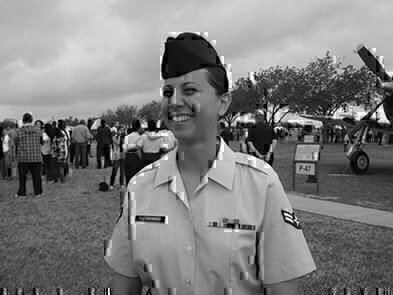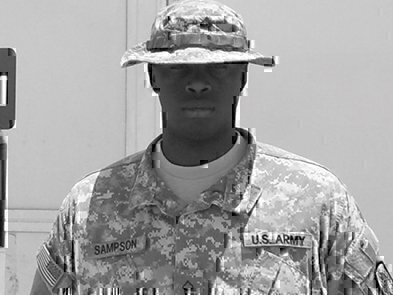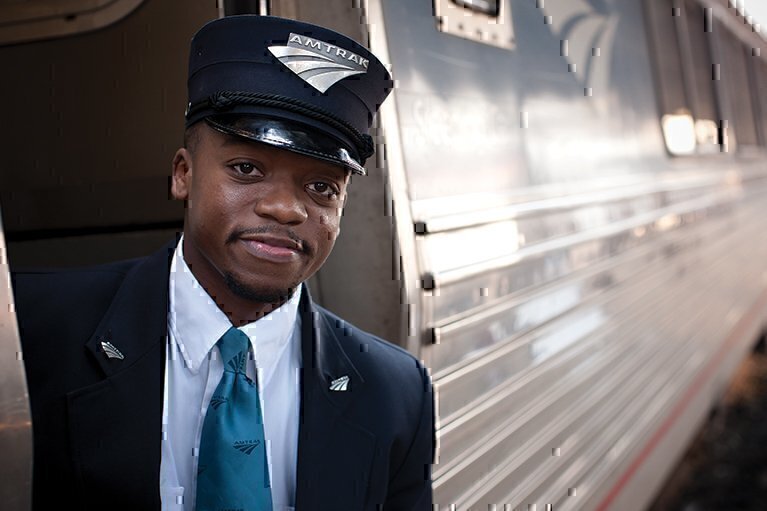[fullwidth background_color=”” background_image=”” background_parallax=”none” enable_mobile=”no” parallax_speed=”0.3″ background_repeat=”no-repeat” background_position=”left top” video_url=”” video_aspect_ratio=”16:9″ video_webm=”” video_mp4=”” video_ogv=”” video_preview_image=”” overlay_color=”” overlay_opacity=”0.5″ video_mute=”yes” video_loop=”yes” fade=”no” border_size=”0px” border_color=”” border_style=”” padding_top=”20″ padding_bottom=”20″ padding_left=”” padding_right=”” hundred_percent=”no” equal_height_columns=”no” hide_on_mobile=”no” menu_anchor=”” class=”” id=””][fusion_text]The railroad industry wants lots of veterans aboard, and Amtrak, for one, knows they are a great fit. America’s top passenger railroad company last year hired 40 percent of its new conductors from prior or current military for their experience in working 24/7 operations. Veterans make up a quarter of Amtrak hires overall.
Pilots, flight engineers, tank commanders and similar military jobs make great railroad engineers, says Craig Kramer, Amtrak’s veteran talent acquisition program manager, “based on their training in safety, situational awareness and operational readiness.”
Amtrak’s linemen often start in the military in avionics and as interior electricians, combat engineers and Seabees. “They bring the technical expertise required when dealing with voltage electrical equipment, and valuable technical skills such as attention-to-detail, technical expertise, emphasis on safety and working as a unit,” Kramer says.
While the railroad industry has seen some layoffs recently, freight carrier Norfolk Southern Corporation, a top player in 22 states, is hiring conductors, engineers, mechanics, electricians and operations supervisors.
“Veterans bring many qualities which epitomize Norfolk Southern’s values and culture, including leadership, reliability, organization and safety,” says Matt Tanana, compensation manager at Norfolk Southern. “Veterans adapt extremely well to the challenging work of field operations, given the similarities of their demanding military lifestyle.” The company believes that teamwork and discipline are fundamentals for working there – and these are fundamentals military veterans always bring.[/fusion_text][/fullwidth][fullwidth background_color=”” background_image=”” background_parallax=”none” enable_mobile=”no” parallax_speed=”0.3″ background_repeat=”no-repeat” background_position=”left top” video_url=”” video_aspect_ratio=”16:9″ video_webm=”” video_mp4=”” video_ogv=”” video_preview_image=”” overlay_color=”” overlay_opacity=”0.5″ video_mute=”yes” video_loop=”yes” fade=”no” border_size=”0px” border_color=”” border_style=”” padding_top=”20″ padding_bottom=”20″ padding_left=”” padding_right=”” hundred_percent=”no” equal_height_columns=”no” hide_on_mobile=”no” menu_anchor=”” class=”” id=””][one_full last=”yes” spacing=”yes” center_content=”no” hide_on_mobile=”no” background_color=”” background_image=”” background_repeat=”no-repeat” background_position=”left top” hover_type=”none” link=”” border_position=”all” border_size=”0px” border_color=”” border_style=”solid” padding=”” margin_top=”” margin_bottom=”” animation_type=”0″ animation_direction=”down” animation_speed=”0.1″ animation_offset=”” class=”” id=””][title size=”2″ content_align=”left” style_type=”double solid” sep_color=”” margin_top=”” margin_bottom=”” class=”” id=””]Jessica Fletschinger[/title][fusion_text]
Staff Auditor, Norfolk Southern
[/fusion_text][/one_full][one_third last=”no” spacing=”yes” center_content=”no” hide_on_mobile=”no” background_color=”” background_image=”” background_repeat=”no-repeat” background_position=”left top” hover_type=”none” link=”” border_position=”all” border_size=”0px” border_color=”” border_style=”solid” padding=”” margin_top=”” margin_bottom=”” animation_type=”0″ animation_direction=”down” animation_speed=”0.1″ animation_offset=”” class=”” id=””][fusion_text]
What do you do? I evaluate the company’s internal control systems, financial reporting processes and adherence to policies.
What worked best in your job search? Knowing what I wanted to find in a job, so that I could narrow down the search, then knowing how to present myself in cover letters, résumés and interviews. It took practice, but in the end I think being certain that portions of my true personality showed through meant that I was able to find a good fit – not just for my working experience, but also for the culture where I would work. This way, I ended up somewhere that I plan to stay.
[/fusion_text][/one_third][one_third last=”no” spacing=”yes” center_content=”no” hide_on_mobile=”no” background_color=”” background_image=”” background_repeat=”no-repeat” background_position=”left top” hover_type=”none” link=”” border_position=”all” border_size=”0px” border_color=”” border_style=”” padding=”” margin_top=”” margin_bottom=”” animation_type=”” animation_direction=”” animation_speed=”0.1″ animation_offset=”” class=”” id=””][fusion_text]
What didn’t work? Trying to “look the part,” or “sound the part” when that wasn’t truly my personality. I think the discomfort showed and both the interviewers and I were left unsure of what I could truly bring to the position. It’s a good way to lose a position that would have been perfect, or worse, to end up somewhere that you’re really not happy and don’t learn from.
What’s the coolest thing about your job? Learning all the inner workings of how the train runs. Such a big company has so many complicated aspects, and I am loving getting to know each one.
Best advice for transitioning service members? Use every bit of educational assistance you can get. Take the extra couple classes to make your training into an associate (degree), get the certification, look at what you’ll need for your bachelor’s. Your experience helps you tremendously, but these days employers want it all, and that extra bit of credentials will pull you up the list.
[/fusion_text][/one_third][one_third last=”yes” spacing=”yes” center_content=”no” hide_on_mobile=”no” background_color=”” background_image=”” background_repeat=”no-repeat” background_position=”left top” hover_type=”none” link=”” border_position=”all” border_size=”0px” border_color=”” border_style=”” padding=”” margin_top=”” margin_bottom=”” animation_type=”” animation_direction=”” animation_speed=”0.1″ animation_offset=”” class=”” id=””][imageframe lightbox=”no” lightbox_image=”” style_type=”none” hover_type=”none” bordercolor=”” bordersize=”0px” borderradius=”0″ stylecolor=”” align=”none” link=”” linktarget=”_self” animation_type=”0″ animation_direction=”down” animation_speed=”0.1″ animation_offset=”” hide_on_mobile=”no” class=”” id=””]  [/imageframe][fusion_text]
[/imageframe][fusion_text]
Military Service: Airman First Class (E-3), Air Force (2011-2012)
AFSC: Mandarin Linguist
Education:
Bachelor’s degree, double major in business administration and accounting/business analytics, Old Dominion University, 2015
[/fusion_text][/one_third][/fullwidth][fullwidth background_color=”” background_image=”” background_parallax=”none” enable_mobile=”no” parallax_speed=”0.3″ background_repeat=”no-repeat” background_position=”left top” video_url=”” video_aspect_ratio=”16:9″ video_webm=”” video_mp4=”” video_ogv=”” video_preview_image=”” overlay_color=”” overlay_opacity=”0.5″ video_mute=”yes” video_loop=”yes” fade=”no” border_size=”0px” border_color=”” border_style=”” padding_top=”20″ padding_bottom=”20″ padding_left=”” padding_right=”” hundred_percent=”no” equal_height_columns=”no” hide_on_mobile=”no” menu_anchor=”” class=”” id=””][one_full last=”yes” spacing=”yes” center_content=”no” hide_on_mobile=”no” background_color=”” background_image=”” background_repeat=”no-repeat” background_position=”left top” hover_type=”none” link=”” border_position=”all” border_size=”0px” border_color=”” border_style=”solid” padding=”” margin_top=”” margin_bottom=”” animation_type=”0″ animation_direction=”down” animation_speed=”0.1″ animation_offset=”” class=”” id=””][title size=”2″ content_align=”left” style_type=”double solid” sep_color=”” margin_top=”” margin_bottom=”” class=”” id=””]Chas Sampson[/title][fusion_text]
Senior Labor Relations Officer, Amtrak
[/fusion_text][/one_full][one_third last=”no” spacing=”yes” center_content=”no” hide_on_mobile=”no” background_color=”” background_image=”” background_repeat=”no-repeat” background_position=”left top” hover_type=”none” link=”” border_position=”all” border_size=”0px” border_color=”” border_style=”” padding=”” margin_top=”” margin_bottom=”” animation_type=”” animation_direction=”” animation_speed=”0.1″ animation_offset=”” class=”” id=””][imageframe lightbox=”no” lightbox_image=”” style_type=”none” hover_type=”none” bordercolor=”” bordersize=”0px” borderradius=”0″ stylecolor=”” align=”none” link=”” linktarget=”_self” animation_type=”0″ animation_direction=”down” animation_speed=”0.1″ animation_offset=”” hide_on_mobile=”no” class=”” id=””]  [/imageframe][fusion_text]
[/imageframe][fusion_text]
Age: 30
Military Service: Specialist (E-4), Army (2006-2011)
MOS: Petroleum Supply Specialist (92F)
Education:
• Bachelor’s degree, business psychology,
Washington State University
• Master’s degree, organizational leadership,
Washington State University
[/fusion_text][/one_third][one_third last=”no” spacing=”yes” center_content=”no” hide_on_mobile=”no” background_color=”” background_image=”” background_repeat=”no-repeat” background_position=”left top” hover_type=”none” link=”” border_position=”all” border_size=”0px” border_color=”” border_style=”solid” padding=”” margin_top=”” margin_bottom=”” animation_type=”0″ animation_direction=”down” animation_speed=”0.1″ animation_offset=”” class=”” id=””][fusion_text]
What do you do? I oversee the labor process, which includes terminating and disciplining employees, correcting employees’ behavior or performance, negotiating labor agreements and representing the organization in arbitration hearings.
What worked best in your job search? Networking, as well as investing in my education, which helped tremendously.
What military skills do you apply to your civilian job? I learned the art of humility and service to others, which has enabled me to empathize with the problems that others may encounter. I find pride in being able to execute daily decisions that affect thousands of employees, while also remaining unknown. It’s the service to others, without reward or recognition, that I apply to my civilian job as well as my personal life.
[/fusion_text][/one_third][one_third last=”yes” spacing=”yes” center_content=”no” hide_on_mobile=”no” background_color=”” background_image=”” background_repeat=”no-repeat” background_position=”left top” hover_type=”none” link=”” border_position=”all” border_size=”0px” border_color=”” border_style=”” padding=”” margin_top=”” margin_bottom=”” animation_type=”” animation_direction=”” animation_speed=”0.1″ animation_offset=”” class=”” id=””][fusion_text]
What surprised you about the civilian workforce? I was surprised with the amount of respect I garnered from my military service. However, I politely inform employees that I prefer to earn respect through the decisions I make, and thanking me for my service is unnecessary. Military service was a job I applied for, and to be able to serve the American people is an honor.
Best advice for transitioning service members? Plan early and often, have multiple plans and be realistic about the job opportunities for which you qualify. The art of finding gainful employment is two-fold. You’re bringing your services to the organization, and the organization is investing in the services you’re offering. Ultimately, remain humble, be prepared to start from the bottom again, and be ambitious.
[/fusion_text][/one_third][/fullwidth]








